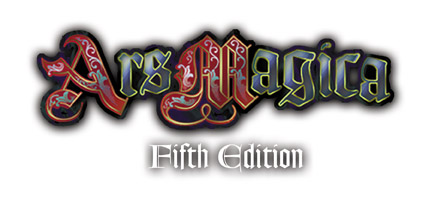Ars Magica House Rules
Stress and Quality Die Minimums
5th edition reintroduced the notion of a stress die without negative results. This is what older editions called a "quality die."
The purpose of stress and quality die are to make the 1d10 rolls much more noticeable. However, it is possible to roll a '1', then a low number to achieve a pitiful result. As such, the following floors (minimums) are used:
| Number of 1's rolled | Minimum Result |
| 1 | 10 |
| 2 | 15 |
| 3 | 20 |
Additional 1's rolled add +5 to the minimum result when the non-1 is finally rolled.
"Take 5"
This is a concept introduced in the d20 system. If an action, spell or other roll takes place in a non-stressful situation (i.e. a simple die roll), a character may "take 5" on the roll. That is, they may assume they rolled a 5 on their die roll to calculate results. The player has the option of rolling, if they so desire. This makes it so that routine applications of skill aren't tested constantly.
Flavoured Vis
Vis may be "coloured" or "flavoured" in addition to, or in place of, standart Arts. For example, what appears to be a pawn of Mentem vis, may function as 3 pawns of vis for the purpose of summoning spirits. Alternatively, it may be a 3 pawn vis source only for summoning spirits, and not work for Frosty Breath of the Spoken Lie. This keeps the mystery in magic.
Flavoured Auras
As with Flavoured Vis, Auras may be aspected to work better, worse or only for a very specific use. Auras may carry multiple such modifiers. For example: A magical aura in a swamp may rate as Level 2, but add +4 to disease-type spells. A level 1 magical aura near a volcano may add +6 to fire-type spells, but penalize Aquam spells by -6.
Spontaneous Spells and Form & Effect Bonuses
In keeping with the Focus & Effect charts printed in the ArM5 main book or any subsequent books, a magus may use items to add a sympathy bonus to spontaneously casted spells, to help them achieve more powerful effects. For example, while casting a spontaneous spell to make oneself invisible, using a quartz will add +5 to the spell casting roll (before division).
Talismans
A magus may attune an invested device as his talisman in the same season as its creation (or in the last season of creation, for multiple-season projects) without any additional costs. An existing device may be opened for attunement and 2 casting bonuses in a single season.
Changing Specializations
A player may change the specialization of a given skill when enough experience points have been accumulated to increase the skill. This change also has a roleplaying requirement to justify the change.
Language Exposure Rules
Characters can pick up a new type of language exposure experience that stacks regular exposure experience to represent picking up the local language. Characters can pick up a maximum of 1 xp per season in a language spoken by the locals of their area. If there is more than one local language, the character can pick which one to gain the xp in.
This language exposure experience is limited by personality traits like xenophobic, proud, prejudice, reclusive, or any other trait that would preclude the character from wanting to pick up another language. For every point in these personality traits, one season of this language exposure experience is lost, starting with the Spring season. It is possible, with enough negative personality traits, to not gain any local language experience.
e.g. A character living in England without any negative personality traits would gain 4 xp in Middle English, at 1 xp per season.
A character with Reclusive +3 would only gain 1 xp in Middle English per year in the Winter season.
